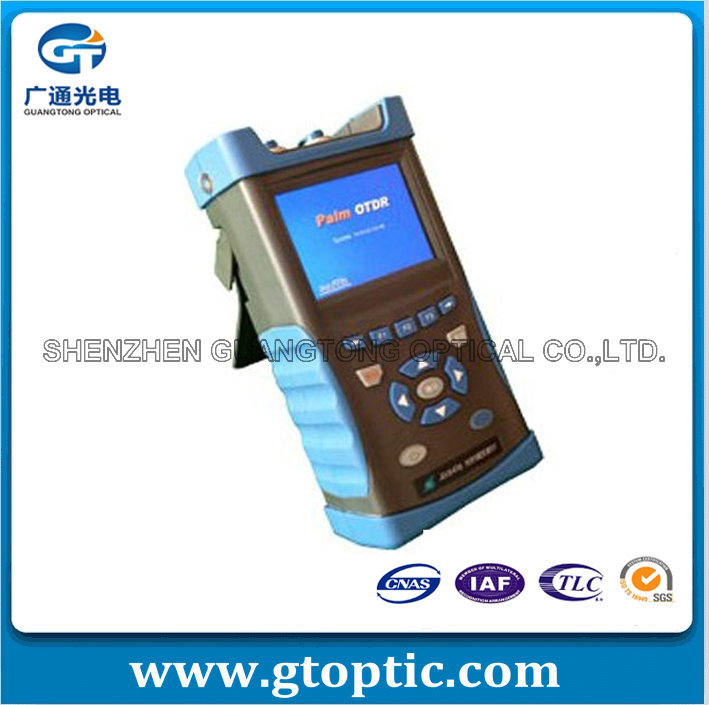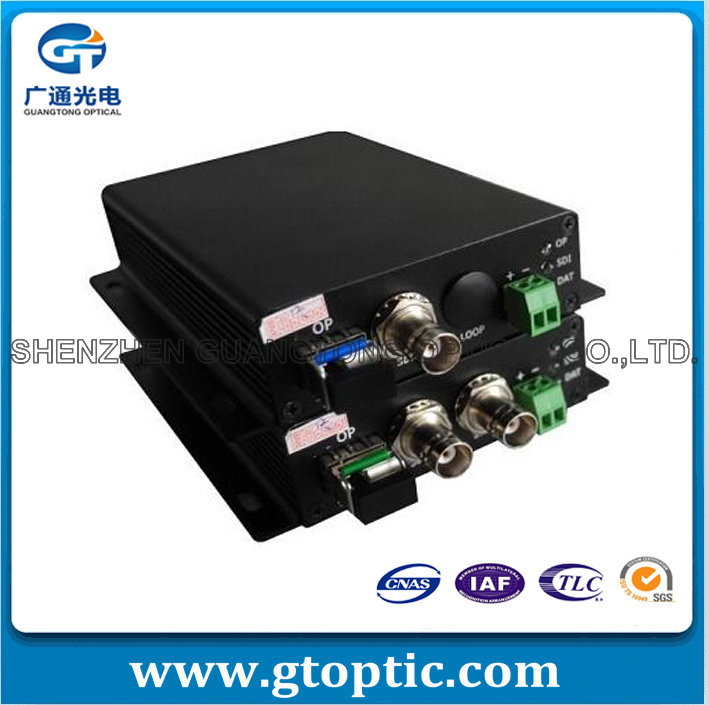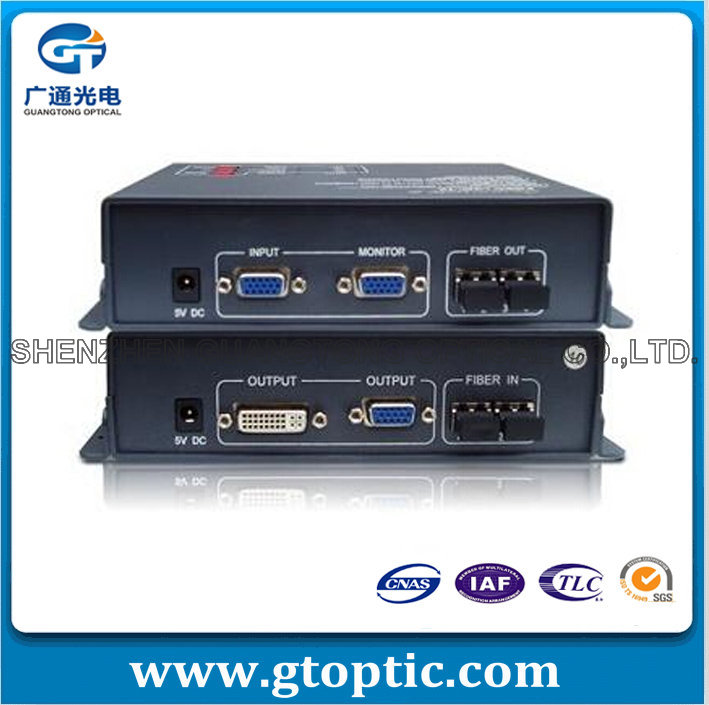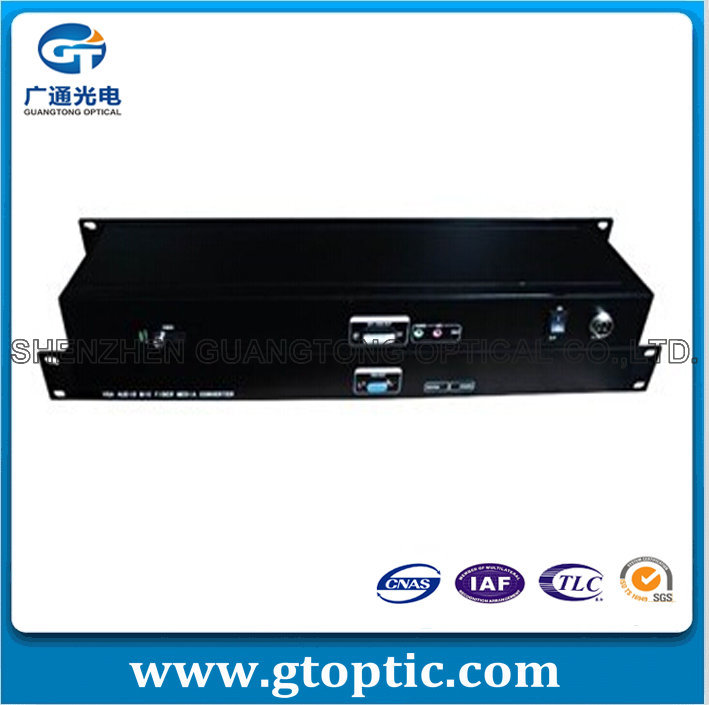Palm OTDR
1. Product Summarizations: GT6416 palm OTDR is the newest instrument designed for testing FTTx network. It's mainly used to measure the physical characteristics of optical fiber under test, such as the length、the transmission loss and the splice loss etc.. It can also locate the faults or breaks of optical fiber. It's widely applied in the manufacture, construction and maintenance in optical fiber communication system.
GT6416 palm OTDR has the most advanced technology of double-color & material integrative mould, which is novel and beautiful in appearance.GT6416 offers three wavelengths and VLF in one handheld unit, especially for testing passive optical network (PON) in FTTx. In addition, it's equipped with comfortable gallus for carrying conveniently.
Mainly features:
1.handheld、lightweight and convenience for carrying
2.The most advanced technology of double-color & material integrative mould in trade
3.Advanced anti-reflective TFT LCD, visible clearly in field
4.1.6m extra-short event dead zone
5. 0.25m high resolution, 65535 sampling points
6. Fast auto measurement, one-button operating
7. Double USB interfaces, supporting USB stick and direct cable download to PC via ActiveSync
8. Supporting Bellcore GR196 file format in writing or reading
9. Function of intelligent indicating of remaining capacity of battery and warning if the voltage of battery is low.
10. WinCE operation system, double operating interface of Chinese and English
11.Built-in lithium battery with high capacity for over 10 hours of operating life
12.Visible fault locating (VFL)
13.Universal FC/PC,FC/SC,FC/ST connector type, it's convenient for surface cleaning
14. Unique function of updating system on-line, returning to factory is unnecessary
Extra-short Event Dead Zone
GT6416 palm OTDR has extra-short event dead zone, which is suitable for testing short optical fiber and pigtail optical fiber.
High-speed auto measurement
The function of auto measurement of GT6416 palm OTDR makes it unnecessary to operator to know about the further details of operating. Simply connect the fiber, press [Start], then the result is displayed in a few seconds, you can view the trace and event table.
High-speed auto analyze
GT6416 can search and locate the events and faults in trace rapidly and precisely, and then lists all events in even table, so it's very useful to maintainers to improving efficiency and it's unnecessary to know about the relative background knowledge.
Strong file management
GT6416 offers powerful function of file management. Besides saving、browsing or deleting files to or from USB stick and built-in memory, it can be connected to laser or inkjet printer based on PCL language, and the testing report can be printed rapidly and easily. In addition, GT6416 can communicate with PC using ActiveSync via USB cable, through which the files can be translated rapidly.
Convenient VFL
The built-in 650nm visual fault location is ideal for easily identifying bad splice, bad connector, break or macro bend.
Communication Light Check
When measuring a fiber in service, the measuring result by an OTDR is not precise. To avoid the imprecision of measurement, this check function checks for the presence of light other than the OTDR optical measurement pulse.
GT416 Palm OTDR is mainly used to measure FTTx network, it provides a low cost solution for users.GT6416 offers three measuring modes: manual mode (including real time mode and average mode), auto mode and dead zone mode.
Manual measurement mode: manual mode is suitable for skilled operator who is familiar with the instrument. In this measurement mode, to get more accurate results, real-time mode or average mode can be selected if necessary.
In real-time mode, the dynamic changes of fiber chain can be detected timely, it is very useful when you need to watch the effect and process of fiber being spliced or connected.
In average measurement mode, the noise in trace can be suppressed, and the SNR(signal noise ratio) is improved, therefore,the result is more accurate. In fact, the more average times are executed, the more noise in trace is suppressed, and the longer time is spent for signal processing. In practice, the average times should be set properly according to necessity.
Auto measurement mode: the optimized measurement conditions are set automatically, it's unnecessary to operator to know about the complicated background knowledge and the further details of operating. In this mode, the more accurate results can be gained when proper average times are set, but it will increase the time of signal processing.
Dead zone mode: this mode is suitable for testing optical fiber with short distance and the optimized settings of distance range, pulse width and attenuator can be executed automatically. To get the best result, the terminal return loss should be guaranteed less than -40dB.
Specifications:
|
MODULE |
2101 |
|
|
|
|
wavelength |
1310nm/1550nm |
|
|
|
|
Applicable Fiber |
|
|||
|
Dynamic Range1 |
28/26dB |
|
|
|
|
Distance Measurement Accuracy |
±(1m + sample space + 0.003% * measurement distance) |
|||
|
Event Dead Zone2 |
≤1.6m |
|||
|
Sampling Resolution |
0.25, 0.5, 1, 2, 4, 8, 16m |
|||
|
Distance Range |
0.5,1,2,4, 8, 16, 32, 64, 128, 256km |
|||
|
Pulse width |
10, 30, 80, 160, 320, 640, 1280, 5120, 10240ns |
|||
|
Loss threshold |
0.01dB |
|||
|
Sampling points |
65534 |
|||
|
Linearity |
0.05dB/dB |
|||
|
Memory capacity |
≥800 Traces |
|||
|
IOR setting |
1.00000∼2.00000 |
|||
|
Display |
Color LCD (touch screen) |
|||
|
Interface |
USB, Min-USB |
|||
|
VFL |
650nm±10nm, 2mW(typical); CW/1Hz |
|||
|
Language |
Simple Chinese/English |
|||
|
Optical Connector |
FC/UPC (universal connector) |
|||
|
Power Supply |
DC:15V∼20V(3A), (AC adapter 100∼240V,50/60Hz,1.5A),Built-in Lithium battery:4400mAh,7.4V,operating time≥10 hours33 |
|||
|
Dimensions |
210mm*100mm*60mm |
|||
|
Weight |
about 1kg |
|||
Note1:pulse width 10240ns, average times≥300,SNR=1,23℃±2℃;
Note2:Pulse width:10 ns, terminal reflection loss: ≥40dB, typical;
Note3:Low brightness, exclude measuring.





